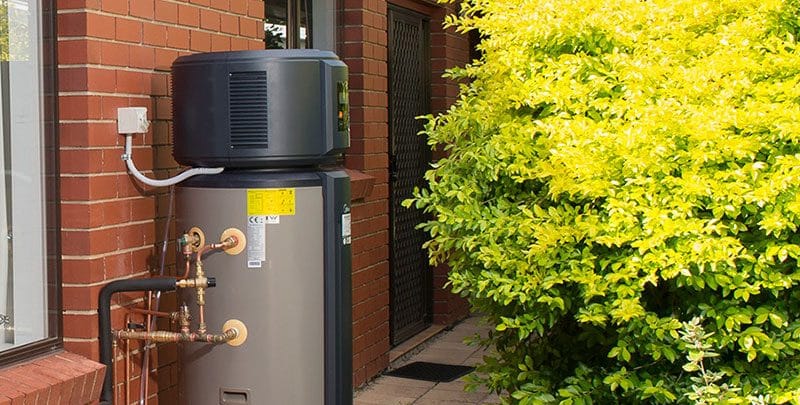
Benefits of Using a Heat Pump Hot Water System
In today’s era, where the pursuit of energy efficiency is more critical than ever, the decision regarding your electric hot water and heating system can shape your household budget and the environmental footprint you leave behind.
The heat pump hot water system is emerging as a noteworthy innovation departing from the conventional approach of traditional water heaters.
These systems cleverly harness the capabilities of heat exchange technology, introducing a new era of hot water supply that is both environmentally friendly and economical.
Heat Pump Hot Water System
As we embark on a journey to explore the manifold benefits of heat pump hot water systems, we must understand the paradigm shift they represent in residential water heating. Unlike their counterparts, these systems operate on principles that conserve energy and contribute to a greener and more economical way of living.
Let’s delve into the intricacies of this technology and uncover the advantages that have propelled it to the forefront of modern home solutions.
How Heat Pump Hot Water Systems Work
To comprehend the ingenuity behind heat pump hot water systems, one must delve into the intricacies of their operation.
At their core, these systems function as heat exchangers, capitalising on the principles of thermodynamics to provide an efficient and sustainable means of heating water.
- Heat extraction: The process begins with the extraction of heat from the surrounding environment. Depending on the type, the heat pump system can source it from the surrounding air, ground, or water.
- Refrigerant circulation: The system transfers the extracted heat to a circulating refrigerant. This refrigerant, known for changing states at low temperatures, is pivotal in heat exchange.
- Compression and heating: The refrigerant, now laden with the absorbed heat, undergoes compression. As it compresses, its temperature rises significantly. Pass the high-temperature refrigerant through a coil or heat exchanger containing water to heat it.
- Heat transfer to water: The elevated temperature of the refrigerant facilitates the transfer of heat to the water in the coil or heat exchanger. This exchange results in the water reaching the desired temperature for household use.
- Circulation and repeating the cycle: The heated water is then circulated to the desired points of use within the home – be it faucets, showers, or appliances. Meanwhile, the refrigerant, having released its heat, undergoes depressurisation and returns to the initial stages of the cycle, ready to extract more heat from the environment.
- Smart controls: Many modern heat pump systems come equipped with intelligent controls. These controls optimise the operation of heat pumps in the system by considering factors such as ambient temperature, hot water demand, and energy tariffs, ensuring an efficient and tailored heating process.
In essence, the beauty of heat pump hot water systems lies in their ability to tap into the naturally occurring heat in the environment and elevate its temperature to meet a household’s domestic hot water needs. This departure from traditional methods conserves energy and positions these systems as a beacon of sustainability in residential water heating.
As we navigate through the myriad benefits of hot water heat pumps, the efficiency of this process will become increasingly apparent, shedding light on why heat pump hot water systems are gaining widespread acclaim.

Benefits of Using a Heat Pump
What are the major benefits of using a heat pump hot water system. Let’s take a look:
-
Energy Efficiency
As we unravel the layers of innovation in heat pump hot water systems, their unparalleled energy efficiency is a prominent aspect that surfaces. Unlike their conventional counterparts, these systems redefine the landscape of residential water heating by harnessing ambient heat to provide a sustainable and economically advantageous solar water heater solution.
-
Using Ambient Heat
At the heart of the energy efficiency of heat pump hot water systems lies their ability to tap into ambient heat from the surrounding environment. Whether the air, space heating, ground, or water, these systems extract warmth that would otherwise go untapped.
-
Reduced Energy Consumption
Traditional water heaters, such as electric or gas models, generate heat directly, consuming more energy. Heat pump systems, however, use the extracted ambient heat pump water heaters to elevate the temperature of the refrigerant, resulting in significantly lower energy consumption.
-
COP – Coefficient of Performance
The Coefficient of Performance (COP) often measures the efficiency of a heat pump. This metric compares the energy supplied to the system with the heat energy delivered. Heat pump systems boast high COP values, indicating their ability to provide more heating output per unit of energy input.
-
Seasonal Performance
Another noteworthy aspect is the seasonal performance of heat pump systems. While their efficiency is evident year-round, these systems are particularly advantageous in moderate climates. Even in colder conditions, technological advancements have equipped modern heat pump systems to operate efficiently, ensuring a continuous hot water supply.
-
Dynamic Adjustments with Smart Controls
Many contemporary heat pump hot water systems have intelligent controls that dynamically adjust the operation based on ambient temperature, hot water demand, and energy tariffs. This intelligent optimisation enhances overall efficiency, ensuring the electric hot water system operates at peak performance levels.
-
Life Cycle Efficiency
When evaluating the energy efficiency of a water heating system, it’s crucial to consider the entire life cycle. With their lower operational costs and extended lifespan, heat pump systems showcase impressive life cycle efficiency. Long-term savings often outweigh the initial investment.
-
Environmental Benefits
Beyond cost savings, the reduced energy consumption of heat pump hot water systems translates to a diminished environmental impact. By running costs and decreasing the demand for energy from conventional sources, these systems contribute to a greener and more sustainable future.
In essence, the energy efficiency of heat pump hot water systems is a game-changer in residential water heating. The utilisation of ambient heat, sophisticated technology, and intelligent controls make these systems an option for budget-conscious homeowners and marks a significant stride toward a more eco-friendly lifestyle.
As we delve into the economic advantages of electric water heaters in homes, this energy-efficient method will increasingly take centre stage, reinforcing the attractiveness of heat pump hot water systems for contemporary households.

Rebates and Incentives
Governments and utility providers worldwide are committed to fostering the adoption of energy-efficient technologies. Authorities offer various rebates and incentives to incentivise the transition to heat-pump hot water systems. Exploring these financial benefits makes the initial investment more appealing and accelerates the adoption of sustainable water heating solutions.
Types of Rebates and Incentives
- Financial rebates: Some governments offer direct financial rebates to homeowners who install heat pump hot water systems. These rebates can significantly offset the upfront costs, making the transition to a more sustainable option more feasible.
- Tax credits: Tax credits are another avenue of financial support. Homeowners may be eligible for tax credits on their annual tax returns, providing an additional incentive to invest in energy-efficient solutions.
- Utility company programs: Many utility providers offer incentive programs to encourage the use of energy-efficient technologies. These programs may include cash incentives, reduced energy rates, or financing options for qualifying systems.
Accelerating the Shift to Sustainability
By taking advantage of these rebates and incentives, homeowners reduce the financial burden of adopting heat pump technology and contribute to broader sustainability goals. The collective impact of widespread adoption can lead to significant reductions in energy consumption and environmental impact.
Explore the Facets of Innovative Technology
In the ever-evolving landscape of residential water heating, the heat pump hot water system emerges as a solution and a transformative force. As we’ve explored the various facets of this innovative technology, it becomes evident that the benefits are multi-faceted and extend far beyond the immediate considerations of cost and convenience.
Delving into the Environmental Impact reveals a commitment to a greener future, where reduced greenhouse gas emissions and a lower carbon footprint become integral to our daily choices. The versatility and adaptability of these systems in different climates underscore their role in creating a sustainable solution for a diverse range of households.
The allure of rebates and incentives adds a pragmatic layer, making the initial investment more accessible and accelerating the shift towards a more sustainable water heating paradigm. Governments and professional services recognise the importance of such transitions, creating a supportive framework for homeowners to make environmentally conscious decisions.
Please note: This information is provided for advice purposes only. Regulations differ from state to state, so please consult your local authorities or an industry professional before proceeding with any work. See our Terms & Conditions here.
Published: 4 Dec, 2023